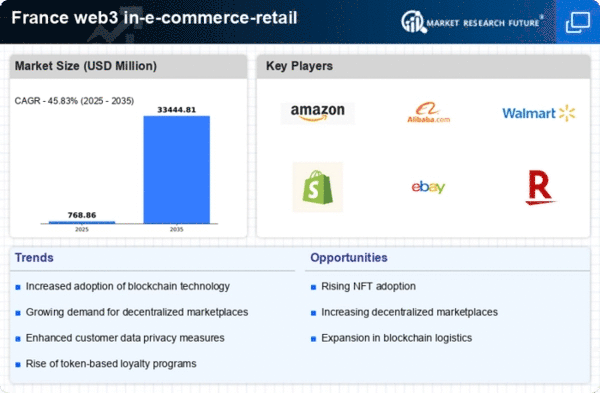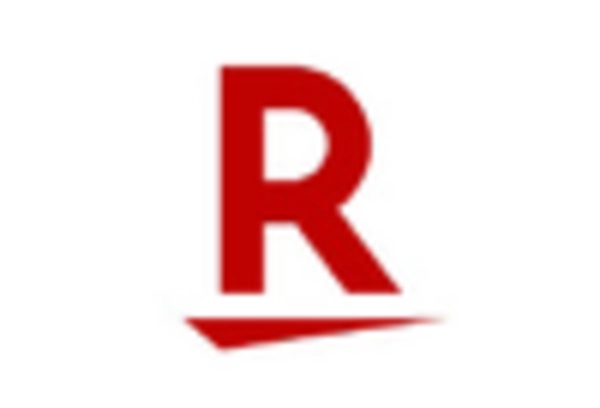Integration of Smart Contracts
Smart contracts are revolutionizing the web3 in-e-commerce-retail market by automating transactions and ensuring compliance with predefined conditions. In France, businesses are increasingly leveraging smart contracts to streamline operations, reduce fraud, and enhance customer trust. The market for smart contract solutions is projected to grow by 40% annually, reflecting a strong demand for efficiency and reliability in e-commerce transactions. These self-executing contracts eliminate the need for intermediaries, thereby lowering transaction costs and expediting the purchasing process. As French retailers adopt this technology, they are likely to enhance their competitive edge, making the web3 in-e-commerce-retail market more attractive to consumers seeking seamless shopping experiences.
Growth of Community-Driven Brands
The rise of community-driven brands is significantly influencing the web3 in-e-commerce-retail market. In France, consumers are increasingly gravitating towards brands that prioritize community engagement and social responsibility. This trend is evidenced by a 30% increase in sales for brands that actively involve their customers in decision-making processes. By leveraging web3 technologies, these brands can create decentralized communities that foster loyalty and collaboration. This shift not only enhances customer relationships but also encourages innovation through collective input. As community-driven brands continue to flourish, they are likely to reshape the landscape of the web3 in-e-commerce-retail market, emphasizing the importance of consumer participation in brand development.
Enhanced Supply Chain Transparency
Supply chain transparency is becoming a critical factor in the web3 in-e-commerce-retail market, particularly in France, where consumers are increasingly concerned about ethical sourcing and sustainability. Blockchain technology enables retailers to provide verifiable information about the origins of their products, fostering trust among consumers. A recent survey indicated that 70% of French consumers are willing to pay a premium for products with transparent supply chains. This demand is prompting retailers to adopt blockchain solutions to enhance traceability and accountability. As transparency becomes a key differentiator in the market, businesses that prioritize ethical practices are likely to gain a competitive advantage, further propelling the growth of the web3 in-e-commerce-retail market.
Rise of Decentralized Marketplaces
The emergence of decentralized marketplaces is reshaping the web3 in-e-commerce-retail market. These platforms enable peer-to-peer transactions without intermediaries, fostering a more direct relationship between buyers and sellers. In France, the adoption of decentralized marketplaces has surged, with a reported increase of 35% in user engagement over the past year. This shift not only enhances transaction efficiency but also reduces costs associated with traditional e-commerce platforms. Furthermore, the decentralized nature of these marketplaces aligns with consumer demand for transparency and security, as blockchain technology ensures that transactions are immutable and verifiable. As more French consumers become aware of these benefits, the web3 in-e-commerce-retail market is likely to experience accelerated growth, driven by the increasing popularity of decentralized solutions.
Consumer Demand for Digital Ownership
The concept of digital ownership is gaining traction within the web3 in-e-commerce-retail market, particularly in France. Consumers are increasingly interested in owning digital assets, such as NFTs, which represent unique items or experiences. This trend is reflected in a 50% increase in NFT sales in the French market over the last year. As consumers seek to establish ownership of digital goods, retailers are adapting their strategies to incorporate these assets into their offerings. This shift not only enhances customer engagement but also opens new revenue streams for businesses. The growing interest in digital ownership is likely to drive innovation within the web3 in-e-commerce-retail market, as companies explore ways to integrate these assets into their product lines.
















